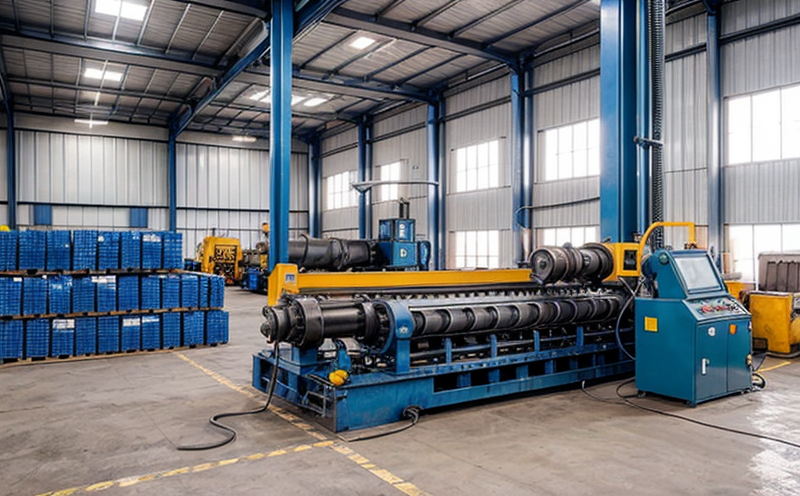ASTM A370 Mechanical Testing Compliance for Steel Machinery Components
The ASTM A370 standard is a cornerstone in the quality assurance and compliance framework of industrial goods and machinery, particularly for steel components. This service ensures that manufacturers adhere to stringent mechanical testing criteria which are critical for the safe operation and reliability of equipment across various sectors including automotive, aerospace, energy, and construction.
The ASTM A370 standard outlines a series of mechanical tests designed to evaluate the tensile properties of metallic materials. These tests provide essential data on material strength, ductility, and other characteristics that are crucial for the design and safety of machinery components. Compliance with this standard is mandatory in many regions as it ensures that manufacturers meet quality benchmarks set by regulatory bodies.
For steel machinery components, ASTM A370 testing involves multiple steps. The process begins with careful specimen preparation which includes cutting the material to precise dimensions and ensuring a smooth surface finish. The prepared specimens are then subjected to tensile testing in an environment controlled for temperature and humidity to ensure accurate results.
The tensile testing machine used must be calibrated according to ASTM A370 specifications. This ensures that all tests conducted are consistent with industry standards, providing reliable data that can be replicated across different laboratories. The test involves applying a known force to the specimen until it breaks or reaches its maximum load capacity. From this data, key mechanical properties such as yield strength, tensile strength, and elongation are calculated.
Accurate reporting of these tests is crucial for compliance with ASTM A370. This includes detailed documentation of test parameters, specimen dimensions, observed results, and any deviations from standard procedures. The report must also include the relevant standards used in conducting the tests (ASTM A370) along with any additional supporting data such as environmental conditions during testing.
Failure to comply with ASTM A370 can have significant implications for manufacturers and suppliers of steel machinery components. Regulatory non-compliance may result in product recalls, legal action, and reputational damage. Moreover, failing to meet these standards could lead to safety hazards in end-use applications, which is especially critical in industries like aerospace and automotive where component integrity is paramount.
By adhering to ASTM A370 mechanical testing compliance, manufacturers can ensure their products meet the highest quality standards, enhancing customer confidence and satisfaction. This not only protects against potential risks but also opens up opportunities for market expansion into regions with stringent regulatory requirements.
Applied Standards
| Standard Code | Description |
|---|---|
| ASTM A370-18 | Tensile testing of metallic materials. |
| ISO 6892:2016 | Tensile Testing of Metallic Materials at Ambient Temperature. |
Customer Impact and Satisfaction
- Avoiding penalties for non-compliance with industry regulations.
- Enhancing the reputation of manufacturing facilities by adhering to international standards.
- Facilitating smoother trade processes across borders that have strict compliance requirements.
- Increasing customer trust through transparent and reliable quality assurance practices.
Competitive Advantage and Market Impact
Compliance with ASTM A370 mechanical testing ensures a competitive edge in the market by providing customers with products that meet stringent quality standards. This not only attracts new clients but also retains existing ones who value reliability and safety. In addition, adherence to these standards can lead to increased export opportunities as many international buyers require suppliers to demonstrate compliance.
Manufacturers who excel at ASTM A370 testing are better positioned to innovate within their product lines by understanding material behavior under various conditions. This knowledge can be leveraged to develop more robust and efficient machinery components, thereby improving overall performance and longevity of products. Furthermore, successful completion of these tests demonstrates a commitment to excellence which is highly valued in competitive markets.
The ability to consistently produce high-quality steel machinery components also enhances the competitiveness of suppliers by setting them apart from competitors who may not meet such rigorous standards. This differentiation can translate into higher sales volumes and greater market share, contributing significantly to long-term business success.





